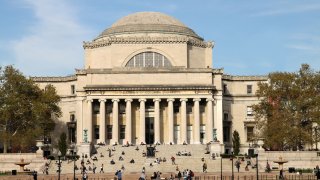
Columbia University said Friday its interim president, Katrina A. Armstrong, is stepping aside, a week after the university struck a deal with the Trump administration to negotiate its federal funding.
Armstrong assumed the role when President Nemat “Minouche” Shafik resigned in August after a tumultuous spring semester that saw protests on campus over the war in Gaza.
She will return to the school’s Irving Medical Center, the university announced in a statement Friday.
Claire Shipman, the co-chair of the board of trustees, will assume the role of acting president, effective immediately, the statement said. The news was first reported by The Wall Street Journal.
Get top local stories in Philly delivered to you every morning. Sign up for NBC Philadelphia's News Headlines newsletter.
“Dr. Armstrong accepted the role of interim president at a time of great uncertainty for the University and worked tirelessly to promote the interests of our community,” said David Greenwald, chair of the board of trustees. “Katrina has always given her heart and soul to Columbia. We appreciate her service and look forward to her continued contributions to the University.”
In a statement, Armstrong said her return to the medical center was planned, and said she was proud to have worked with the institution, which she called a "special place."
"It has been a singular honor to lead Columbia University in this important and challenging time," Armstrong said. "But my heart is with science, and my passion is with healing. That is where I can best serve this University and our community moving forward."
U.S. & World
Stories that affect your life across the U.S. and around the world.
The school last week agreed to a list of demands by the Trump administration to start negotiations to restore $400 million in federal funding. The funding was pulled earlier this month after the administration accused the New York school of “inaction in the face of persistent harassment of Jewish students.”
Columbia was a hot spot of student protests last spring over Israel's war in Gaza, which was launched in response to Hamas' Oct. 7, 2023, terror attack in Israel. That attack claimed the lives of about 1,200 people and saw about 250 taken hostage in the enclave, Israeli officials have said.
More than 50,000 people in Gaza have been killed, according to the Palestinian Ministry of Health in the enclave.
Students at Columbia protested the university's involvement with Israel, calling on the school to divest from the Middle Eastern country and setting up a pro-Palestinian encampment on campus. A group of students eventually occupied a building on campus, Hamilton Hall, prompting the New York Police Department to be called.
Students faced expulsion, discipline and arrests over their refusal to shut down the encampment and comply with Columbia's demands.
Earlier this month, Mahmoud Khalil, a Palestinian graduate student who helped lead last spring's protests, was arrested by federal immigration agents. The government has said his arrest was over his alleged support for Hamas, a designated terrorist organization
Khalil, who was told his student visa was being revoked on the night of his arrest, is being held in federal custody in Louisiana.
A judge has ruled Khalil is to remain in the United States “to preserve the court’s jurisdiction” as the court weighs a filing challenging his arrest and planned deportation.
Khalil and seven other Columbia students also sued the school and the House Education and Workforce Committee this month to block Columbia from handing over to the government disciplinary records of students who were involved in protests on campus.
Since Khalil's arrest, a number of other international college students have been taken into federal immigration custody as the Trump administration cracks down on deportations.
Matt Lavietes contributed.
This article first appeared on NBCNews.com. Read more from NBC News here:



